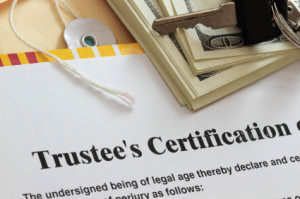
Your Chapter 13 bankruptcy case is going to take 3-5 years to come to completion. I often tell my clients that we’ll be close friends the whole time, working together to smooth out rough spots and keep things rolls. It’s my job to take your financial situation seriously, after all.
The judge assigned to your Chapter 13 case plays a far smaller role, getting involved only if there’s a major dispute or issue that can’t otherwise be resolved.
Lurking in the shadows is the Chapter 13 bankruptcy trustee. Who is this person, and what’s their purpose?
Who Is The Chapter 13 Trustee?
The Executive Office of the United States Trustee appoints and supervises standing trustees and monitors and supervises cases under chapter 13 of title 11 of the United States Code.
The Bankruptcy Reform Act of 1978 removed the bankruptcy judge from the responsibilities for day-to-day administration of cases because the judge also appointed and supervised the trustee.
It was a conflict of interest, or so it seemed.
In response, most of the administrative functions in the bankruptcy system were placed within the U.S. Department of Justice by the creation of the United States Trustee Program.
Duties Of A Chapter 13 Trustee
The Chapter 13 trustee is responsible for the estate, and does not represent either the creditor or the person filing for bankruptcy. The primary duties of the Chapter 13 bankruptcy trustee are:
- Be accountable for all property received during the Chapter 13 bankruptcy case;
- Ensure the debtor performs the debtor’s intention;
- Investigate the financial affairs of the debtor;
- Examine proofs of claims and object if necessary;
- Oppose the discharge of the debtor when necessary;
- Provide information concerning the estate and the estate’s administration as is requested by a party in interest;
- Make a final report and file a final account of the administration of the estate with the United States Trustee and the court;
- Appear at all hearings concerning the value of property subject to a lien, confirmation of a plan, or modification of the plan after confirmation.
- Help the debtor to perform under the Plan (though the trustee isn’t allowed to provide you with legal advice);
- If there is a claim for domestic support obligation (DSO), provide the applicable notice to the holder of the claim and appropriate State child support enforcement agency; and
- If the debtor is engaged in business:
- investigate the acts, conduct, assets, liabilities, and financial condition of the debtor, the operation of the debtor’s business and the desirability of the continuance of such business, and any other matter relevant to the case or to the formulation of a plan; and
- once the investigation is completed, file a statement of the investigation.
What The Chapter 13 Trustee Will Not Do
The Chapter 13 bankruptcy trustee isn’t your lawyer. He or she won’t give you legal advice, won’t tell you what to do, and cannot answer legal questions for you.
This is largely an administrative position, though a critical one that someone’s got to do in order to keep your case rolling along.
Always Remember The Human Element
My first Chapter 13 bankruptcy case was simple, but I was young and inexperienced.
My papers weren’t sent to the Chapter 13 trustee in the proper order. In response he made things difficult for my clients.
I hadn’t contacted his office to find out their procedures in advance, which he took as a personal affront.
It was a mistake I never made again.
It serves to illustrate the point that the trustee’s role and duties are at once clear and nebulous.
Each Chapter 13 trustee does things in their own way. If your lawyer doesn’t take the time to gain the knowledge necessary, your case may suffer.
And when it comes to something as important as a Chapter 13 bankruptcy, you want to be sure that things are a smooth as possible.